- Home
- Rodman Philbrick
Lobster Boy Page 2
Lobster Boy Read online
Page 2
That’s my plan. But when my dad gets a beer from the Frigidaire and goes back to the TV couch, all he says is, “Be careful. I couldn’t stand it if you drowned yourself.”
I go, “You could give me a hand,” but he don’t say nothing back.
Outside, it’s real still, like it gets when the sun has just gone down and the tide is about to change. Like the world is holding its breath and you want to hold yours, too, to make it last. I climb out on the plank and tighten up the ropes some and then there’s nothing to do but wait. Hoping that old Mr. Woodwell got it right, and the tide will lift the boat. I’ll save worrying about the ruined engine for later.
All the barrels have to do is raise the boat clear of the bottom, then I can pull the bow onto shore. I got that rigged, too, a one-ton come-along winch where all you got to do is crank the handle. That was my idea, and Mr. Woodwell approved.
I’m thinking about all these things at once: the tide coming in, the barrels floating over the sunk boat, what happened to the boat when it went underwater and how much of the gear got ruined, my dad on the couch. My dad on the couch and the summer ahead of me like a big blue train I’m chasing.
I’m thinking so hard, I don’t hear Captain Keelson rowing down the creek.
“Skiff Beaman!” he says, loud enough to jog me. “What’s up, Little Skiff?”
Captain Keelson is leaning on his oars. Even in the dark I can see the worry on his face. He ain’t near as old as Mr. Woodwell, but he’s pretty old. He says the rowing keeps him young, but if you ask me, it don’t show much.
“Boat went under,” I tell him.
He nods. “Yup, I can see that. You rig those steel drums by yourself?”
“Mr. Woodwell told me how.”
“Ah yup. What happens when she lifts?”
I tell him about the come-along winch. He thinks about it and nods again. “Should work,” he says, talking in his slow way. “Where’s your paw?”
“Just nipped inside. He’ll be right out.”
“That so? Well, you give him my regards.”
Then he glides away, dipping his long oars into the water so smooth and soft, it makes me wish I could be rowing, too, out on the creek in the dark, rowing away from everything.
Thinking about rowing on the dark water makes me tired and I lie back on the dock for just a little while, with the current humming around the pilings. Moving water sounds sleepy, like a tired person going “shush”, and before you know it I’m flat-out fast asleep.
In the dream I’m adrift on the current in a leaky boat in the dark of night and can’t find my oars and can’t see the shore and can’t do nothing to save myself. I want to shout out for help but my voice don’t work and it don’t matter anyhow because there’s no one can hear me.
What finally wakes me is the barrels nudging against the dock, bonk-bonk, and the top of the Mary Rose white as the moon, raised up from the bottom, come back to life, just waiting on me to fix her.
4
Rotten to the Keel
My dad never does come out to see the boat. When I wake him up on the TV couch and tell him the Mary Rose is high and dry, he looks at me like he don’t understand.
“How’d you manage that?” he asks.
When I explain about the barrel rig, he shakes his head. “All on your lonesome?” he says, like I bragged on going to the moon and back and he didn’t quite believe me. “A twelve-year-old boy, and small for his age?”
“I ain’t that small! Plenty boys my age are smaller’n me. Besides, a thing don’t have to be difficult if you give it some thought and apply a little elementary physics.”
I knew that one would stump him, if he didn’t guess I’d borrowed it from Mr. Woodwell. But as nice as he was being, acting all impressed, it still wasn’t enough to shift him off the TV couch and see it with his own eyes.
I’m bone-tired from cranking on that winch but too excited to go to bed yet, so I go out on the dock and stand there under all the stars and admire the boat. What with the dark and the deep shadows, you can’t tell how hurt she is, or know the engine is probably ruined. At night she don’t look much worse than the last time she was hauled out for painting, more than a year ago.
They say a thing that’s broke can always be fixed, if you work at it. And that’s what I intend to do, no matter what.
When morning comes, I’m up with the sun, busting around the kitchen like an itch you can’t scratch. That’s what my mom used to say when I got an idea in my head and wouldn’t be shut of it. This morning my idea is pancakes first and then fix the boat. I’m a demon for pancakes. That’s another thing my mom used to say. I’m in mind of her because of the boat, I guess. But Dad don’t want to hear nothing about Mom; he says it only gets him down and what’s the use and better not to think about it.
So far he’s been doing a pretty good job of not thinking about much of anything, but he don’t say no to a plate of pancakes.
“These Aunt Jemima from the box?” he asks.
“No, she come over and helped me mix ’em up from scratch,” I say. “What’s a matter, they don’t taste good enough for you?”
“No, no. They’re perfect, Skiff. Delicious. I didn’t mean – they remind me…oh, never mind.”
Pancakes ain’t supposed to make you look like you want to cry. Me, I’m feeling fine and dandy; I won’t let no blubbery looks ruin what I got in mind for the morning, which is fix the boat, have lunch, then go fishing.
The boat got a different idea. When I crouch and look under, down at the bottom by the keel, I can see where one whole plank has come loose. I poke at her with my jackknife and the wood is soft and crumbly. Rotten. I can’t figure what to do about it, so I climb in the boat and pull up the floorboards and look at it from that side.
One thing I know, you ain’t supposed to see daylight when you look at the bottom of a boat. This is bad, real bad. I’m worried maybe the whole of her is rotten and can’t be fixed. That she’ll never float again. That all my plans for the summer are just plain stupid, and Tyler Croft is right about me being a swampy good-for-nothing.
Or maybe I ate too many pancakes and the syrup has gone to my head. Like Mom used to say, looking at the thing won’t fix it. And since I ain’t got the first clue where to start, I get in my skiff and row up to Mr. Woodwell’s place again.
When I get there he’s out in the shed where he used to build his boats. It’s a big, spacey kind of building with windows high up, and daylight coming down in beams, and the clean smell of wood shavings in the air.
He’s standing by the tool bench but not working on nothing. Just smoking on his corncob pipe and looking kind of wistful. Thinking about the empty shed, I guess, and all the boats he built there.
“’lo, Samuel,” he says. “Did she rise?”
I tell him everything worked just like he said it would, and the Mary Rose is high and dry, but now I’m stumped. I tell him about the plank that sprung loose near the keel, and how I’m pretty sure it’s gone bad.
Mr. Woodwell puffs on his pipe for a bit. “Your dad could repair that, no trouble at all. He knows about such things.”
“He’s not in the mood for fixing stuff.”
“But you’re willing?”
I nod. “Only I don’t know how.”
Those cool grey eyes of his kind of soak me up as he thinks about it. When he speaks it comes out deliberate and careful, like always.
“You’re willing to learn, I can see that. Mmm,” he goes, puffing on the cob. “I’ll have to survey the damage. Yup, that’s the first thing. Can you get me down there in your skiff, do you think? To the scene of the crime?”
The old man takes a long time lowering himself from the dock to the skiff, but I know better than to rush him. Once he’s settled, I row out into the creek and let the current take us.
Mr. Woodwell trails a hand in the water and smiles with his eyes, staring off at the tall pine trees along the shore. “Been some time since I’ve been out on the creek,” he says. “Thank
you.”
“I ain’t done nothing. You’re the one doing the favour.”
That makes him chuckle deep in his throat. “You always say it straight out, don’t you? Much like your father. Did you know he worked for me when he was your age and a bit older?”
“Sure,” I say. “He still brags on it.”
“Does he now? He was a quick study, Big Skiff was, and a hard worker. By which I mean he worked hard to get it right, whatever he did. Could have been a fine boatbuilder if he’d had a mind to. But the sea drew him. Wanted that open sky around him. Finest kind of fisherman, your father. Best man with a harpoon in Spinney Cove, no doubt about it.”
“I guess.”
“It’s still there. Give him time.”
“Yes, sir, I will.”
But really I’m thinking, what can you do with a man who blubbers when you make him pancakes?
I give Mr. Woodwell a hand getting from my skiff to our dock and it’s amazing how light he is, for a grown-up. Like his bones are hollow or something.
“There now,” he says, straightening up. “I’ll take just a minute. If I move too fast, my head forgets where it is.”
“Yes, sir.”
“Do you know how old I am, Samuel?”
“No, sir.”
“I’ll be ninety-four in August. I was an old man when your father came to work for me, and that was many years ago.”
“Yes, sir.”
“My eyes aren’t so good, but I can still see a thing by touching.”
“Yes, sir.”
“I’m telling you this because it will take me some time and I’m asking you to be patient. Boys are not patient creatures, as a rule.”
I swear to him I’ll be patient, but waiting for the old man does try me. Watching paint dry is a speed sport compared to watching Mr. Woodwell inspect Rose. He touches every part of her with his skinny bone-looking old hands, from the bow all the way along the keel to the stern. He has to bend over to get under the boat, and I can see it hurts him, but there’s a look in his eye that says don’t say nothing, and I don’t.
It’s getting on to noon when the old man finally works himself out from under the boat. “You may help me stand,” he says, holding out his hand.
I help him up. He takes a deep breath and finds his balance.
“Could be worse,” he says.
“The boat,” I say, “or you?”
That gets him laughing until his eyes are wet. “Oh, you are a spark, Samuel.” He takes a breath that whistles inside his nose. “Now, the boat. Garboard planks are rotten on both sides of the keel, but the keel itself is sound enough. There’s nothing that can’t be repaired. No reason the Mary Rose can’t be made as good as new.”
That makes me so happy, I run up to the house to tell my dad, even if he don’t care right now.
5
Attack of the Vampire Mud Worms
I’m wrong about Dad, sort of. Turns out he’s pleased about the boat, or anyhow about Mr. Woodwell helping me fix her.
“Good old Amos,” my dad says, sitting up on his couch. “I most forgot he was still alive! Amos Woodwell! Yup, he give me a hand when I really needed it, way back when.”
“He said you could have been a real fine boatbuilder, if you wanted.”
“Amos said that?” my dad goes, acting pleased. “I don’t know. There was a time I followed him around like a little puppy dog. Things were pretty bad at home, if I remember correctly, and I moved into Amos Woodwell’s boat shed for the summer and partways into the fall. He taught me a few things. Not just boats.”
“Mr. Woodwell says there’s nothing wrong with Rose that can’t be fixed.”
He nods and rubs his eyes. “Amos’d know. She was one of the last boats came out of his shed.”
I ain’t seen my dad acting this interested in anything for a long while, but it don’t last. When I start telling him what we got to do, pulling off the bad planks and stuff, his eyes get that look that means he’s not listening and pretty soon he’s staring at the TV again and sighing. The sighing part really gets my goat.
I suppose a really good son wouldn’t try to shame his father, but I can’t help it, the words just come out mean. “Hey, Dad? I’m off to get the toolbox. You recall the toolbox? Man needs tools to work. Screwdrivers and hammers and stuff. Plenty of tools there, you want to help,” and so on.
Might as well talk to the TV, for all the good it does.
The Mary Rose is waiting for me with her bad side turned up, like a dog holding up a hurt paw. Mr. Woodwell says the only thing I need right now is a screwdriver and a pry bar, but I bring along a hammer, too, just in case I want to hit something.
“Hello, Rose,” I say, sliding under the bottom and wiggling my way down to where the keel sits in the mud. It’s drippy under there because the planks are still weeping and you got to be careful of barnacles. Barnacles are sharp as razors if you hit ’em just right.
“Mr. Woodwell says I got to pry off these two planks, Rose. I hope you don’t mind.”
Sounds pretty crazy, a boy talking to a boat, but I always talked to that boat, ever since I was little. My mom used to say don’t worry unless the boat talks back to him. It ain’t happened yet, and I don’t expect it ever will. But that don’t stop me trying.
“Weren’t your fault you sank,” I tell her. “That was us, not taking care of you. Hold on now, this won’t hurt a bit,” I say, trying to work the pry bar along the plank that came loose. Being careful, ’cause Mr. Woodwell says we need the whole thing in as near as one piece as I can manage, so we can trace it out and cut another just like it. But the rotten plank is stubborn, and I have to leave off the pry bar and dig out the screws that hold it to the ribs.
Takes me most of the day to back out the screws. And I have to keep apologizing to the boat for swearing every time I scrape my knuckles on a barnacle.
“Ouch! You miserable…stinking…scum-sucking …stupid barnacle!”
I’m still trying to work the first plank loose when something bites me in the back. I sit up quick and bump my head against the plank, and that don’t improve my language. Then it bites me again and suddenly a bunch of things are down inside my underwear, wriggling around and nipping at me.
That gets me crawling out from under the boat as fast as I can. It ain’t until I’m standing up that I figure out what’s going on. Mud worms! I been lying on one place for so long, they finally found me. I’m mad enough to spit, and scared, too, because they won’t stop biting.
The only thing I can think to do is strip off my pants and jump in the water. That works. When I hit the cold water and give my underwear a shake, the worms let go. But it ain’t over, not quite. Soon as I wade back to shore and pick up my pants, this monkey starts hooting at me. Monkey by the name of Tyler Croft.
“Hooey! Lobster boy! That where you take a bath, that dirty old creek?!”
Just my luck. Tyler and a couple of his rich-kid buds from up the cove. Joey Gleeson and Parker Beal. Parker ain’t no bigger than me, but hanging with Tyler makes him think he’s tough, I guess. All three of them showing off on their fancy mountain bikes.
“Hey Skiffy!” goes Parker Beal. “Is that mud on your underwear or did you poop in your pants?”
“Come on down here and find out,” I tell him.
No chance of that. Might ruin his hundred-dollar shoes. After a while they get sick of calling me names and ride away laughing.
Maybe I should feel bad, getting made fun of like that, only it seems so stupid, I can’t take it serious.
Bloodsucking mud worms, now that’s serious.
No point telling my dad about the worms, he’d only say a swamper boy should know better than to lie down in the mud. Anyhow, by the time I get cleaned up he’s already had a bunch of beers and don’t want to talk.
Like I said before, some kids when their fathers drink, they bust up the house or hit their mom or worse. Not my dad. He just lies on the couch and don’t say nothing. Only way I can te
ll is the smell of beer and the way he breathes sort of heavy.
“’lo, Dad,” I go, “mind if I watch?”
He makes a grunt that means “go ahead”, and I flop down in the ratty old chair by the ratty old couch and stare at the screen. Actually it’s a show I like, about cops and lawyers solving crimes and stuff, where everything gets settled in the end. Wouldn’t that be great, if everything really fixed itself that easy? Like if because I raised the boat my dad would quit drinking and turn over a new leaf or something.
It don’t work that way in the real world. Still, even with the beer and all, it’s sort of cool, the two of us watching the same show and probably thinking the same things about it.
In the end he’s asleep before the show gets over. I already know what happens, so I turn off the TV and go, “Sleep tight and don’t let the bedbugs bite.”
When I’m halfway up the stairs, he calls out, sort of sleepy, “Your mother used to say that.”
“She still does,” I say, because it’s true inside my head.
He don’t say nothing to that.
6
The Finest Kind
One of the best things about Mr. Woodwell’s boat shed is the clean smell of wood shavings and varnish. It sort of clears my head to take a deep breath. Even the smoke from his little corncob pipe smells good, the way it blends in.
When I drag the bad planks into the shed, he’s sitting on a stool at his workbench, sharpening his chisels on an oil stone.
“’lo, Samuel,” he says without looking up. “Lay those down on the sawhorses, if you please, next to the cedar planks.”
I lay ’em down and rub my hands on my pants. “Took a lot longer than I figured.”
Mr. Woodwell nods as he wraps his chisels up in soft cloth. “That’s the way it is with boats.”
I reach in my left pocket and pull out an envelope. “I only got twenty-eight dollars for the new wood right now,” I tell him. “So can we go up to that and then stop?”
The old man smiles. “I figured to charge you exactly what I paid for it,” he says, “which was nothing.”

 Who Killed Darius Drake?: A Mystery
Who Killed Darius Drake?: A Mystery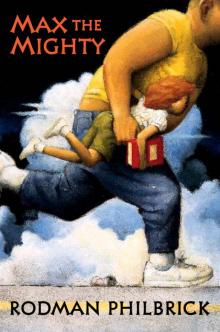 Max the Mighty
Max the Mighty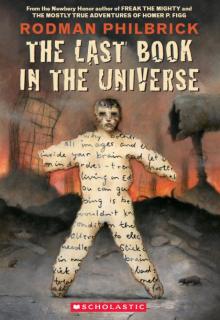 The Last Book in the Universe
The Last Book in the Universe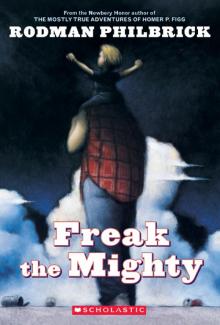 Freak the Mighty
Freak the Mighty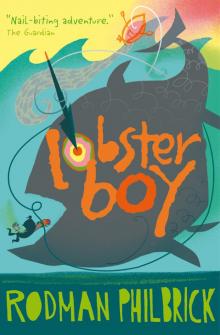 Lobster Boy
Lobster Boy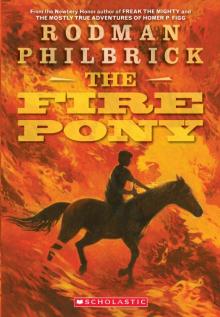 Fire Pony
Fire Pony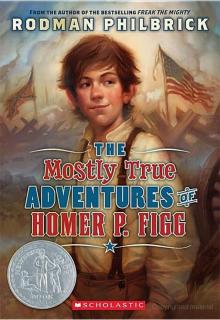 The Mostly True Adventures of Homer P. Figg
The Mostly True Adventures of Homer P. Figg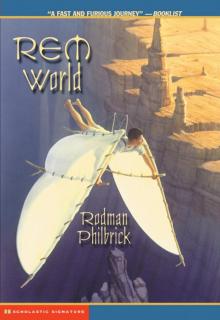 Rem World
Rem World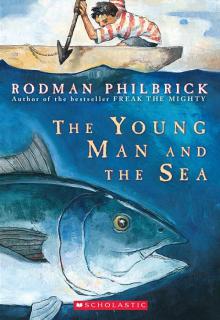 The Young Man and the Sea
The Young Man and the Sea Wildfire
Wildfire Coffins
Coffins The Big Dark
The Big Dark Strange Invaders
Strange Invaders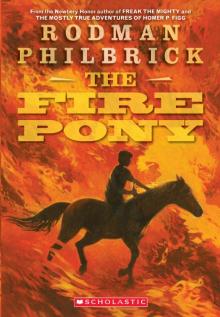 The Fire Pony
The Fire Pony The Haunting
The Haunting Abduction
Abduction Who Killed Darius Drake?
Who Killed Darius Drake?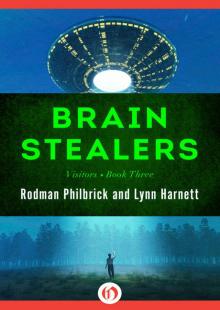 Brain Stealers
Brain Stealers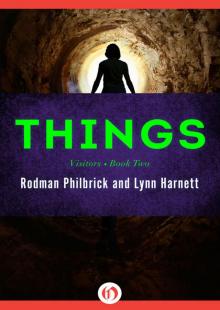 Things
Things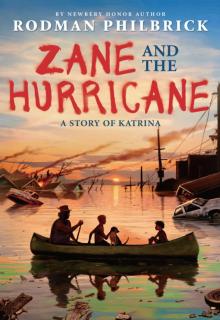 Zane and the Hurricane
Zane and the Hurricane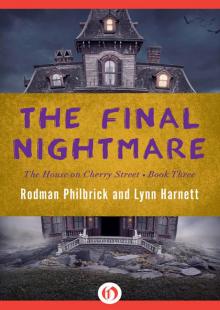 The Final Nightmare
The Final Nightmare The Horror
The Horror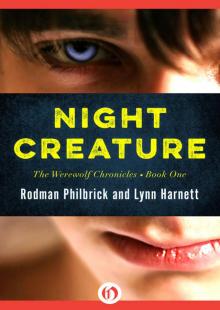 Night Creature
Night Creature Children of the Wolf
Children of the Wolf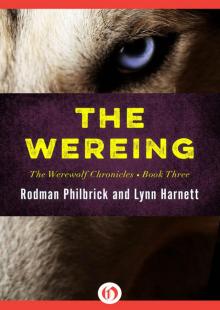 The Wereing
The Wereing